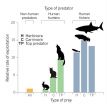The Lancet Neurology: Experts claim number of people with dementia in some Western European countries could be stabilizing
Risk of dementia may be falling due to improved education and living conditions, and better prevention and treatment of vascular diseases, highlighting the need for policies to improve health across the lifecourse
2015-08-21
(Press-News.org) In a Policy View published in The Lancet Neurology journal, a group of leading experts on the epidemiology of dementia state that the number of people with dementia - both new cases and total numbers with the disease - in some Western European countries is stabilising despite population ageing, in direct contrast to the "dementia epidemic" reported in some recent studies.
The Policy View discusses data from five large epidemiological studies done in Sweden, the Netherlands, the UK, and Spain that compare dementia occurrence in old people across two periods of time using the same methods of diagnosing dementia in the same geographical regions (figure 1 [1]). The findings suggest that prevalence (ie, the percentage of the population with dementia) and incidence (the number of new dementia cases over a given time) of dementia in specific age groups are falling across time and generations (figure 3 and panel 3).
Estimates of the proportion of dementia cases within countries are needed to plan for the provision of care, yet much of the evidence used at both national and local levels (eg, the UK's NHS primary care targets) is based on research started in the 1980s. "These old studies support the idea of a continuing 'dementia epidemic', but are now out of date because of changes in life expectancy, living conditions, and improvements in health care and lifestyle," [2] says Carol Brayne, lead author and Professor of Public Health Medicine at the Cambridge Institute of Public Health (CIPH), University of Cambridge in the UK.
Findings from four of the five studies analysed in the Policy View showed non-significant changes in overall dementia occurrence over the past 20 to 30 years. The UK study showed a significant reduction (about 22%) in overall prevalence in people aged 65 years in 2011 than the predicted estimates in 1990, resulting in stabilisation of estimated numbers of people with dementia. Results from the study done in Zaragoza (Spain) showed a significant decline in dementia prevalence in men aged 65 and older (about 43%) between 1987 and 1996. The studies done in Stockholm (Sweden) and Rotterdam (the Netherlands) showed that the age-specific incidence of dementia is falling in these regions.
"The suggested decrease in dementia occurrence coincides with improvements in protective factors (such as education and living conditions) for dementia and a general reduction in risk factors (such as vascular diseases) over recent decades," explains Brayne. "Incidence and deaths from major cardiovascular diseases have decreased in high-income countries since the 1980s. We are now potentially seeing the results of improvements in prevention and treatment of key cardiovascular risk factors such as high blood pressure and cholesterol reflected in the risk of developing dementia." [2]
According to the researchers, although the decrease in dementia occurrence is a positive sign, dementia care will remain a crucial challenge for many years because of population ageing. "It is important to remember that the number of people over age 85 is the fastest growing age demographic, with about 40% currently estimated to be affected by dementia," [2] says co-author Yu-Tzu Wu from CIPH, University of Cambridge in the UK.
Professor Brayne concludes, "Our up-to-date evidence suggests a relatively optimistic picture of possible future trends in dementia occurrence and strengthens the need to shift more of our societal and research focus to primary prevention across the lifecourse, with a rebalancing from what could be seen as the current overemphasis on diagnostics and drug interventions for dementia (which detect early or later assumed pathology). Policies which address determinants of health in earlier life stages and enhance cognitive reserve for populations may have the greatest long term impact on reduction of dementia risk at given ages in later life as well as on population health more generally." [2]
INFORMATION:
NOTES TO EDITORS:
[1] The studies allow meaningful comparisons of prevalence and incidence over time because they use the same methods of diagnosing dementia between two time-points.
[2] Quotes direct from authors and cannot be found in text of Policy View.
ELSE PRESS RELEASES FROM THIS DATE:
2015-08-21
Highlights
Among kidney transplant recipients, patients with mostly IgG3 donor-specific HLA antibodies had a higher likelihood of organ rejection soon after transplantation.
If rejection occurred in those with mostly IgG4 antibodies, it was usually much later after transplantation.
Washington, DC (August 20, 2015) -- The dominant antibody type present in the blood of transplant recipients may indicate their likelihood of experiencing organ rejection, according to a study appearing in an upcoming issue of the Journal of the American Society of Nephrology (JASN). ...
2015-08-20
DALLAS, Aug. 20, 2015 -- Caregiver spouses of stroke survivors are at an increased risk of mental and physical health issues that may continue for years, according to research in the American Heart Association journal Stroke.
Swedish researchers evaluated 248 stroke survivors, below age 70 (average mid-sixties), and their spouses at stroke onset and compared the results with 245 non-stroke controls for seven years after the stroke event.
At the seven-year follow-up, 16.5 percent of survivors had suffered a recurrent stroke. Spouses of survivors reported lower scores ...
2015-08-20
Boston, MA -- A widely used class of industrial chemicals linked with cancer and interference with immune function--perfluorinated alkylate substances, or PFASs--appears to build up in infants by 20%-30% for each month they're breastfed, according to a new study co-authored by experts from Harvard T.H. Chan School of Public Health. It is the first study to show the extent to which PFASs are transferred to babies through breast milk, and to quantify their levels over time.
"We knew that small amounts of PFAS can occur in breast milk, but our serial blood analyses now show ...
2015-08-20
In-depth interviews conducted by researchers at the Johns Hopkins University School of Medicine of 20 young women attending an urban sexually transmitted disease clinic have documented a variety of unexpected, unintended sexual encounters linked to their alcohol use before sex occurs.
Links between alcohol use and risky or deleterious sexual encounters are not necessarily new, say investigators, but this small study identifies very specifically the disconnect between what young women have in mind when they drink and have sex and what really happens.
"The idea behind ...
2015-08-20
According to a survey conducted by Rhode Island Hospital researchers, there is significant variability regarding how clinicians manage catheters placed in the arteries of patients in intensive care units. Some practices may increase risk of infection associated with these catheters. Fewer than half of those surveyed complied with current Centers for Disease Control and Prevention (CDC) infection prevention guidelines for arterial catheter insertions. The study was published today in Critical Care Medicine.
"Barrier precautions are employed inconsistently by critical care ...
2015-08-20
Washington, DC - August 20, 2015 - Swedish exchange students who studied in India and in central Africa returned from their sojourns with an increased diversity of antibiotic resistance genes in their gut microbiomes. The research is published 10 August in Antimicrobial Agents and Chemotherapy, a journal of the American Society for Microbiology.
In the study, the investigators found a 2.6-fold increase in genes encoding resistance to sulfonamide, a 7.7-fold increase in trimethoprim resistance genes, and a 2.6-fold increase in resistance to beta-lactams, all of this without ...
2015-08-20
PHOENIX, Ariz. -- Aug. 20, 2015 -- A study by the Translational Genomics Research Institute (TGen) and other major research institutes, found a new set of genes that can indicate improved survival after surgery for patients with pancreatic cancer. The study also showed that detection of circulating tumor DNA in the blood could provide an early indication of tumor recurrence.
In conjunction with the Stand Up To Cancer (SU2C) Pancreatic Cancer Dream Team, the study was published in the prestigious scientific journal Nature Communications.
Using whole-exome sequencing ...
2015-08-20
If dark energy is hiding in our midst in the form of hypothetical particles called "chameleons," Holger Müller and his team at the University of California, Berkeley, plan to flush them out.
The results of an experiment reported in this week's issue of Science narrows the search for chameleons a thousand times compared to previous tests, and Müller, an assistant professor of physics, hopes that his next experiment will either expose chameleons or similar ultralight particles as the real dark energy, or prove they were a will-o'-the-wisp after all.
Dark energy ...
2015-08-20
Management of boreal forests needs greater attention from international policy, argued forestry experts from the International Institute for Applied Systems Analysis (IIASA), Natural Resources Canada, and the University of Helsinki in Finland in a new article published this week in the journal Science. The article, which reviews recent research in the field, is part of a special issue on forests released in advance of the World Forestry Congress in September.
"Boreal forests have the potential to hit a tipping point this century," says IIASA Ecosystems Services and Management ...
2015-08-20
This news release is available in Japanese.
Humans are just one of many predators in this world, but a new study highlights how their intense tendency to target and kill adult prey, as well as other carnivores, sets them distinctly apart from other predators. As humans kill other species in their reproductive prime, there can be profound implications -- including widespread extinction and restructuring of food webs and ecosystems--in both terrestrial and marine systems. To evaluate the nature of human predation compared to nonhuman predation, Chris Darimont et al. conducted ...
LAST 30 PRESS RELEASES:
[Press-News.org] The Lancet Neurology: Experts claim number of people with dementia in some Western European countries could be stabilizing
Risk of dementia may be falling due to improved education and living conditions, and better prevention and treatment of vascular diseases, highlighting the need for policies to improve health across the lifecourse

